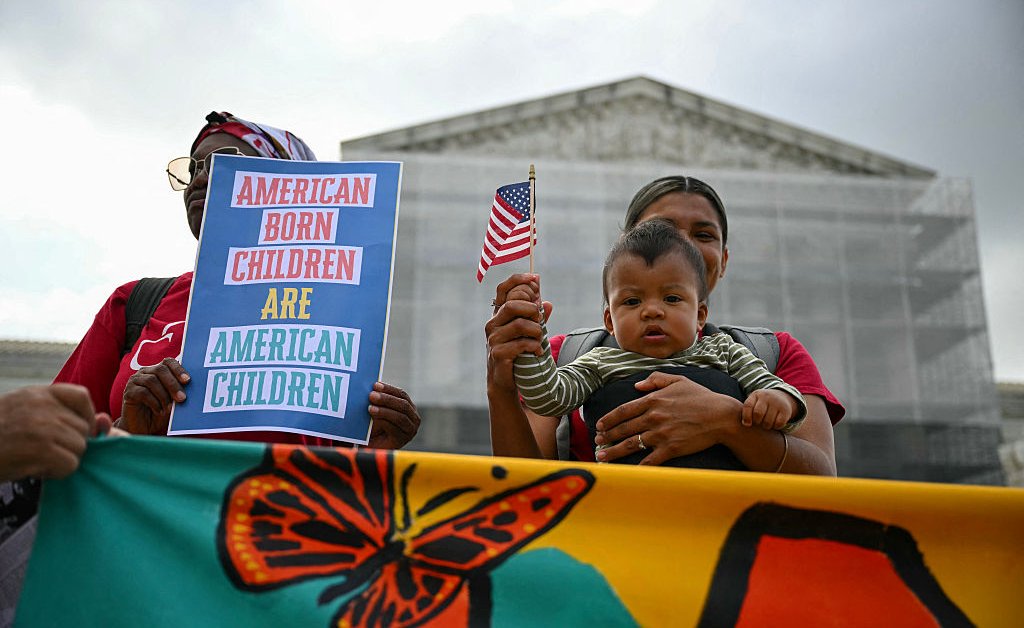Birthright Citizenship Under Scrutiny: Supreme Court Weighs Constitutional Implications

Welcome to your ultimate source for breaking news, trending updates, and in-depth stories from around the world. Whether it's politics, technology, entertainment, sports, or lifestyle, we bring you real-time updates that keep you informed and ahead of the curve.
Our team works tirelessly to ensure you never miss a moment. From the latest developments in global events to the most talked-about topics on social media, our news platform is designed to deliver accurate and timely information, all in one place.
Stay in the know and join thousands of readers who trust us for reliable, up-to-date content. Explore our expertly curated articles and dive deeper into the stories that matter to you. Visit Best Website now and be part of the conversation. Don't miss out on the headlines that shape our world!
Table of Contents
Birthright Citizenship Under Scrutiny: Supreme Court Weighs Constitutional Implications
The future of birthright citizenship in the United States hangs in the balance as the Supreme Court prepares to potentially revisit the long-standing principle enshrined in the 14th Amendment. This fundamental right, guaranteeing citizenship to anyone born within U.S. borders, regardless of the parents' immigration status, is facing unprecedented legal challenges. The implications of a potential Supreme Court ruling against birthright citizenship are far-reaching, impacting immigration policy, national identity, and the lives of millions.
The 14th Amendment: A Cornerstone of Citizenship
The 14th Amendment, ratified in 1868, contains the Citizenship Clause, which states: "All persons born or naturalized in the United States and subject to its jurisdiction, are citizens of the United States and of the State wherein they reside." This seemingly straightforward clause has been interpreted for decades as establishing birthright citizenship, often referred to as jus soli. This principle contrasts with jus sanguinis, where citizenship is determined by the citizenship of one's parents.
However, the precise meaning of "subject to its jurisdiction" has become a focal point of recent legal battles. Opponents of birthright citizenship argue that the clause doesn't apply to children born to undocumented immigrants, claiming that such children are not fully "subject to its jurisdiction." This interpretation challenges the established legal precedent and has significant ramifications for immigration law.
The Arguments For and Against Birthright Citizenship
Proponents of birthright citizenship argue that altering the 14th Amendment would overturn a century and a half of legal precedent and create significant societal upheaval. They point to the potential for mass deportations, the disruption of families, and the erosion of the nation's welcoming tradition. Furthermore, they highlight the economic contributions of immigrant families and the potential negative impact on the workforce. [Link to a relevant article supporting birthright citizenship]
Conversely, opponents argue that birthright citizenship encourages illegal immigration and creates a strain on public resources. They contend that the current system allows for "birth tourism," where individuals travel to the U.S. solely to give birth to a child who will automatically become a citizen. [Link to a relevant article opposing birthright citizenship] They propose alternative pathways to citizenship that focus on merit and legal immigration processes.
The Supreme Court's Potential Impact
The Supreme Court's decision on this matter will undoubtedly have a profound impact on American society. A ruling against birthright citizenship could lead to:
- Significant policy changes: Congress might be forced to re-evaluate immigration laws and potentially implement stricter measures.
- Legal challenges: Numerous lawsuits could challenge the legality of deportations and other actions taken based on a new interpretation of the 14th Amendment.
- Social and political upheaval: The decision could exacerbate existing tensions around immigration and national identity.
The Road Ahead
The Supreme Court's deliberation on this case is a critical moment in American history. The outcome will redefine the meaning of citizenship and impact the lives of millions. The ongoing debate highlights the complex intersection of constitutional law, immigration policy, and societal values. Regardless of the final ruling, the issue of birthright citizenship will undoubtedly continue to be a subject of national debate for years to come. Staying informed about the Court's decision and its implications is crucial for all citizens.
Call to Action: Follow reputable news sources for updates on the Supreme Court's decision and engage in respectful dialogue about this crucial issue. Understanding the complexities of the debate is key to participating in informed discussions about the future of citizenship in the United States.

Thank you for visiting our website, your trusted source for the latest updates and in-depth coverage on Birthright Citizenship Under Scrutiny: Supreme Court Weighs Constitutional Implications. We're committed to keeping you informed with timely and accurate information to meet your curiosity and needs.
If you have any questions, suggestions, or feedback, we'd love to hear from you. Your insights are valuable to us and help us improve to serve you better. Feel free to reach out through our contact page.
Don't forget to bookmark our website and check back regularly for the latest headlines and trending topics. See you next time, and thank you for being part of our growing community!
Featured Posts
-
 The Missed Chance For Peace Examining Putins Strategic Errors In Ukraine
May 17, 2025
The Missed Chance For Peace Examining Putins Strategic Errors In Ukraine
May 17, 2025 -
 May 16 2025 Chelsea Man United Preview And Predictions
May 17, 2025
May 16 2025 Chelsea Man United Preview And Predictions
May 17, 2025 -
 Premier League Odds And Best Bets Manchester United To Upset Chelsea
May 17, 2025
Premier League Odds And Best Bets Manchester United To Upset Chelsea
May 17, 2025 -
 Rising Temperatures Rising Risks Climate Changes Threat To Healthy Pregnancies
May 17, 2025
Rising Temperatures Rising Risks Climate Changes Threat To Healthy Pregnancies
May 17, 2025 -
 Live Tv Outrage Tyrrell Hattons Unhinged Moment At The 2025 Pga Championship
May 17, 2025
Live Tv Outrage Tyrrell Hattons Unhinged Moment At The 2025 Pga Championship
May 17, 2025
